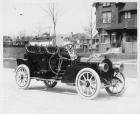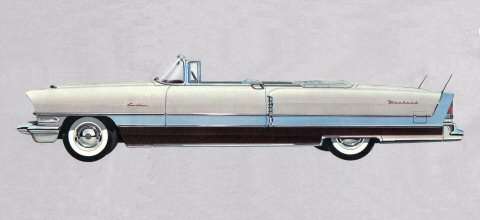|
Re: Troubleshoot Loud Ticking 2498 288 Ultramatic
|
||||
|---|---|---|---|---|
|
Home away from home
|
Are your valve guides new?
Isn't a valve that bounces more an indication that the valve and seat are mating well? Shouldn't guides be reamed to spec? Maybe you have a tight guide that is causing a valve to stick? Pistons were not removed, correct? If the ticking sound is present at an idle, you could try removing plug wires one at a time to see if the sound goes away on a certain cylinder. If a valve is sticking open and being closed by the combustion cycle the sound should go away, or be less noticable when the plug wire is pulled. Is the sound present both when the engine is cold and when it is at operating temp? Share your video and let us have a listen. I'm curious! I had a ticking/tapping noise in my 327. It was rather illusive, and took a bit to track it down.
Posted on: 12/23 17:58
|
|||
|
||||
|
Re: Troubleshoot Loud Ticking 2498 288 Ultramatic
|
||||
|---|---|---|---|---|
|
Home away from home
|
- When is the noise most apparent? Low or high engine speeds? Heavy load, light load, deceleration?
- What frequency is the noise? Crankshaft speed or camshaft speed? Or is it irregular? Could simply be an exhaust leak, the manifolds are known to warp and often need refaced.. And yes, share the video. Your accurate description of the problem is only as good as your own troubleshooting skills. In other words, if you think it's a valve noise, who are we to disagree except to hear it ourselves? But maybe someone will have a better guess.
Posted on: 12/23 18:29
|
|||
|
1955 400 | Registry | Project Blog
1955 Clipper Deluxe | Registry | Project Blog 1955 Clipper Super Panama | Registry Email (Parts/service inquiries only, please. Post all questions on the forum.) service@ultramatic.info |
||||
|
||||
|
Re: Troubleshoot Loud Ticking 2498 288 Ultramatic
|
||||
|---|---|---|---|---|
|
Home away from home
|
Are your valve guides new?
Response: No. Isn't a valve that bounces more an indication that the valve and seat are mating well? Shouldn't guides be reamed to spec? Maybe you have a tight guide that is causing a valve to stick? Response: Guides were reamed to spec. Pistons were not removed, correct? Response: Pistons were not removed. If the ticking sound is present at an idle, you could try removing plug wires one at a time to see if the sound goes away on a certain cylinder. If a valve is sticking open and being closed by the combustion cycle the sound should go away, or be less noticable when the plug wire is pulled. Response: Just tried removing plug wires one at a time with slight decrease in speed but no noticeable change in clicking. Is the sound present both when the engine is cold and when it is at operating temp? Response: Starts clicking within 20-30 seconds when started cold. Or at least becomes very noticeable after 20-30 seconds.
Posted on: 12/23 18:36
|
|||
|
||||
|
Re: Troubleshoot Loud Ticking 2498 288 Ultramatic
|
||||
|---|---|---|---|---|
|
Home away from home
|
- When is the noise most apparent? Low or high engine speeds? Heavy load, light load, deceleration?
Response: Most apparent at idle and during heavy acceleration. - What frequency is the noise? Crankshaft speed or camshaft speed? Response: On analog tachometer at about 550 RPM, the audio spectrum peaks are as follows: 1st peak is -30 dB at 112 hz 2nd peak is -29 dB at 1113.7 hz 3rd peak is -31 dB at 5672 hz. Or is it irregular? Response: It is regular. Could simply be an exhaust leak, Response: Frankly I believe there may be an exhaust leak. This was noticeable around the manifolds earlier in this process by using Seafoam and revving the engine. Subsequently, I torqued the manifolds to 30. If there are some more suitable tools I'd be happy to have them pointed out. I used a straight socket/extension on 1/8 and 3/6 nuts. I used a socket, universal joint and extension on 2/7. I used an offset open-ended crowfoot and extension on 4/5. the manifolds are known to warp and often need refaced.. Response: The intake/exhaust manifolds were resurfaced as an assembly and installed and torqued IAW the "1951-1954 Service Manual" Engine_IX.pdf.. I did inadvertently run the engine pretty hot the first time I adjusted the valves. This was when the automatic choke wasn't operating freely. And yes, share the video. Your accurate description of the problem is only as good as your own troubleshooting skills. In other words, if you think it's a valve noise, who are we to disagree except to hear it ourselves? But maybe someone will have a better guess. Response: I can upload zip files to the forum. There is an Adobe web page that I hope I can use to zip the mp4.
Posted on: 12/23 19:27
|
|||
|
||||
|
Re: Troubleshoot Loud Ticking 2498 288 Ultramatic
|
||||
|---|---|---|---|---|
|
Home away from home
|
Interesting. Piston slap is common on old engines, but has the opposite symptom, as it is most apparent when the engine is cold, when the aluminum piston has the largest difference in size compared to the iron block.
Instead it seems like this sound occurs only when your oil has warmed up and hence is thinner. Offhand I would suspect that it is a piston wrist pin knock as that apparently sounds pretty similar to valve noise, and is most obvious at idle. The pin also doesn't move all that much compared to the crank, so the oil takes more time to heat up and thin out from viscosity. The most apparent tell-tale is that it usually sounds like a double-knock. I'm not aware of a way to diagnose this in particular, but it would stand to reason that grounding or removing the spark plug in the suspected cylinder should change the noise. Maybe #2 cylinder from what you said? Edit: Your spectrometer reading is: - 1/4 crank speed (the normal firing noises of an engine that fires 8 cylinders over 2 crankshaft rotations) - 2x crank speed (one noise per raise or lower of a given piston) - 11x crank speed (maybe a double knock as I suspected?)
Posted on: 12/23 19:30
|
|||
|
1955 400 | Registry | Project Blog
1955 Clipper Deluxe | Registry | Project Blog 1955 Clipper Super Panama | Registry Email (Parts/service inquiries only, please. Post all questions on the forum.) service@ultramatic.info |
||||
|
||||
|
Re: Troubleshoot Loud Ticking 2498 288 Ultramatic
|
||||
|---|---|---|---|---|
|
Home away from home
|
There is a new development that I think just started today. There is a significant amount of water coming from the tailpipe. I mopped it up and restarted the engine. It expelled probably a 1/2 cup of water in maybe about a minute and is steaming.
After the engine got hot I re-torqued the head, anywhere from about 1/2 to 3/4 of a turn each. The head gasket is probably blown.
Posted on: 12/23 21:03
|
|||
|
||||
|
Re: Troubleshoot Loud Ticking 2498 288 Ultramatic
|
||||
|---|---|---|---|---|
|
Home away from home
|
Yeah, that could do it...
How many passes did you make originally and are you using an asbestos gasket? (Fiber between thin sheet metal if so, otherwise solid sheet metal.) On a V8 which is half the head bolts, and a non-aesbstos gasket, I need to make 2 full passes at 60 before #1, on the 3rd pass, is at least at 55. If using an asbestos gasket you have to retorque after a couple heat cycles then maybe again after some hundreds of miles. I forget the exact suggested routine.
Posted on: 12/23 21:22
|
|||
|
1955 400 | Registry | Project Blog
1955 Clipper Deluxe | Registry | Project Blog 1955 Clipper Super Panama | Registry Email (Parts/service inquiries only, please. Post all questions on the forum.) service@ultramatic.info |
||||
|
||||
|
Re: Troubleshoot Loud Ticking 2498 288 Ultramatic
|
||||
|---|---|---|---|---|
|
Home away from home
|
It is normal for some water to be expelled from the exhaust after starting cold, especially in cool weather. Every gallon of gasoline burned releases about 3 gallons of water. Most of this will go out the exhaust as vapor, but when the engine and exhaust system are cool, some of it will condense and collect in the exhaust system, especially in the muffler and tail pipe. Repeated cold starting of the engine without driving the car can allow a substantial amount of water to collect. Many mufflers have small drain holes at one end to allow condensate to drain off. These are often plugged, which allows more water than normal to collect in the system. Starting and idling a cold engine will produce condensate in the exhaust system, and revving the engine after a short period of cold running may blow liquid water out the tailpipe. It's always best to run a car for at least ten miles whenever it is started, especially in colder weather. Not doing so will will allow water to collect in the exhaust system, and some will also get into the crankcase. If your car is in condition to drive, driving it on the road with some normal load on the engine for a few miles will allow heat to drive the moisture out of the exhaust system and the crankcase. In your case, I would re-torque the head and manifold assembly, following the correct procedure, and then drive the car for half an hour or more and watch for any evidence of problems. If you can't drive it, at least run it at a fast idle, about 1400 RPM, for 15 minutes or more.
Posted on: 12/24 9:58
|
|||
|
||||
|
Re: Troubleshoot Loud Ticking 2498 288 Ultramatic
|
||||
|---|---|---|---|---|
|
Home away from home
|
Visible exhaust steam is normal in cool weather, and if the exhaust system has collected water after a cold start, or series of cold starts, a lot of steam will be generated as the system heats up.
Posted on: 12/24 10:02
|
|||
|
||||








